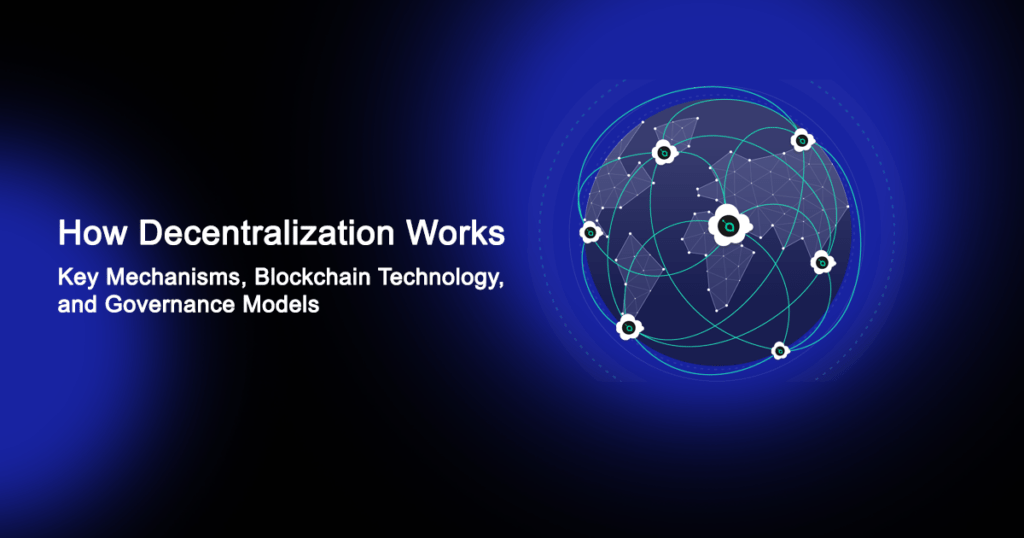
Decentralization is transforming global systems by shifting power away from centralized authorities. This approach enhances transparency, security, and efficiency. Let’s explore how decentralization works, its key mechanisms, blockchain’s role, and different governance models.
What is Decentralization?
Decentralization distributes decision-making and control among multiple entities instead of a single authority. This system exists in finance, governance, and technology. Unlike centralized systems, it reduces reliance on a central body, making operations more transparent and secure.
Key Mechanisms of Decentralization
Decentralization works through several essential mechanisms. These ensure fairness, transparency, and efficiency.
1. Distributed Ledger Technology (DLT)
A decentralized system uses a shared ledger, where multiple nodes validate and store transactions. This mechanism eliminates the need for a central authority, ensuring data integrity and security.
2. Smart Contracts
Smart contracts are self-executing agreements with predefined conditions. Once conditions are met, the contract executes automatically. This eliminates intermediaries, reducing costs and enhancing efficiency.
3. Tokenization
Many decentralized systems operate using tokens. These digital assets represent ownership, access, or participation rights. In Pakistan, tokenized assets could revolutionize real estate transactions by reducing fraud and ensuring transparency.
4. Consensus Mechanisms
Decentralized networks rely on consensus mechanisms to validate transactions. Popular methods include:
- Proof of Work (PoW): Used in Bitcoin, requiring computational power to validate transactions.
- Proof of Stake (PoS): Validators hold tokens to verify transactions, reducing energy consumption.
- Delegated Proof of Stake (DPoS): Users vote for delegates who validate transactions, ensuring faster processing.
Blockchain’s Role in Decentralization
Blockchain is the backbone of decentralized systems. It offers a secure, immutable, and transparent way to record transactions. Each block contains verified data, linked to the previous block, forming a tamper-proof chain.
Benefits of Blockchain-Based Decentralization
- Security: Transactions are encrypted and immutable.
- Transparency: Public ledgers allow anyone to verify records.
- Efficiency: Eliminates intermediaries, reducing costs and delays.
In Pakistan, blockchain can streamline land registry systems, reducing corruption and ownership disputes.
Governance Models in Decentralization
Governance in decentralized systems varies. Different models determine how decisions are made.
1. On-Chain Governance
Decisions occur directly on the blockchain through proposals and voting. Participants use tokens to vote on changes. This ensures transparency but can favor large stakeholders.
2. Off-Chain Governance
Decisions happen outside the blockchain, through discussions and community consensus. Ethereum’s development process follows this model, allowing developers and stakeholders to propose changes.
3. Hybrid Governance
A mix of on-chain and off-chain governance. This balances transparency with flexibility, making it ideal for evolving systems.
Challenges of Decentralization
Despite its advantages, decentralization has challenges:
- Scalability: Processing transactions across multiple nodes can slow down systems.
- Regulatory Concerns: Many governments, including Pakistan’s, struggle to regulate decentralized technologies.
- Security Risks: While blockchain is secure, smart contract vulnerabilities can lead to hacks.
Decentralization’s Impact on Pakistan
Decentralization can reshape Pakistan’s economy and governance. It can:
- Improve Financial Inclusion: Cryptocurrencies enable cross-border transactions without banks.
- Enhance Transparency: Blockchain can reduce corruption in government procurement.
- Empower Citizens: Decentralized voting systems can strengthen democracy.
Conclusion
Decentralization is revolutionizing global systems through blockchain technology and innovative governance models. While challenges exist, its benefits in transparency, efficiency, and security make it a promising future for finance, governance, and beyond. In Pakistan, embracing decentralization can lead to significant advancements in various sectors.
Stay tuned for more insights on cryptocurrency, DeFi, and Web3 advancements!

